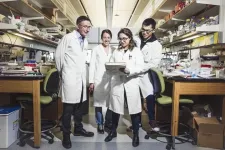(Press-News.org) Researchers from University of Queensland, University of Melbourne, and Universidad Finis Terrae published a new paper in the Journal of Marketing that studies consumer resistance to a nationwide plastic bag ban implemented in Chile in 2019.
The study, forthcoming in the Journal of Marketing, is titled "How Do I Carry All This Now?': Understanding Consumer Resistance to Sustainability Interventions" and is authored by Claudia Gonzalez-Arcos, Alison M. Joubert, Daiane Scaraboto, and Jörgen Sandberg.
As environmental crisis challenges accelerate, governments are searching for solutions to reduce the negative impacts of economic activity. One popular measure has been to ban disposable plastic bags. Bans on plastic bags may seem like an easy way to reduce plastic pollution, but are often met with strong pushback by consumers, retailers, and other members of society.
The researchers studied consumer resistance to a nationwide plastic bag ban implemented in Chile in February 2019 with the goal of answering the following questions: What causes consumer resistance to sustainability interventions such as bans on plastic bags? And how can consumer resistance be reduced to make such interventions more effective? They conducted interviews, observed consumers, and collected documents, news articles, and social media posts related to the Chilean ban, starting in 2013 when an initial ban in coastal areas was announced until four months after the implementation of the ban in the entire country in 2019.
Gonzalez-Arcos says, "We discovered that consumers refuse to accept or support a sustainability intervention because the individual behaviors being targeted--in this case using disposable plastic bags for shopping--are not separate from, but embedded in, social practices." Social practices are activities, materials, and meanings that are similarly understood and shared by a group of people. Eating, cooking, shopping, driving, and reading are examples of social practices shared by large groups. These practices determine people's way of life and, to a large extent, who they are. From this perspective, a behavior such as using a plastic bag to carry groceries is simply a performance of the socially shared, habituated practice of shopping.
An intervention like banning plastic bags triggers change in the social practice of shopping because plastic bags are one of the materials that constitute this practice. Plastic bags are used in many shopping activities (bagging groceries, carrying them home) and meanings (convenience, speed). To change the social practice of shopping after a plastic bag ban, consumers need to navigate three processes: (1) sensemaking, which means understanding and developing new meanings for the changing shopping practice; (2) accommodating, which means developing new competencies for using and handling the new materials used to shop; and (3) stabilizing, which means performing the changed practice often and efficiently. Consumers do not find these processes easy: engaging in them disrupts routines, lifestyles, and even consumers' perceptions of themselves.
In addition to changed social practices such as shopping, consumers face other challenges that prompt them to resist plastic bag bans. Plastic bags and other sustainability interventions often fail to acknowledge that individual actions are part of broader social practices and aim for individual behavioral change rather than change to the social practice itself. Consequently, consumers face three major challenges: (1) battles about who is responsible for making practices more sustainable; (2) unsettling emotions brought about by the changing practice; and (3) changes to other linked practices that dismantle their ways of life. Once these reasons for consumer resistance are known, they provide greater clarity around why consumers will push back against sustainability interventions.
"Consumer resistance interferes with social practice change, which significantly undermines the effectiveness of the sustainability intervention. Our findings show policy makers and other agents involved in sustainability interventions that changing social practices--not individual behaviors--should be their primary goal," explains Joubert. The study presents a framework for designing and managing practice-based sustainability interventions that considers the role of consumer resistance.
To plan and design a practice-based intervention, the researchers recommend the following steps:
Identify the practice being targeted (e.g., shopping), and how it is likely to be disrupted (e.g., material will be eliminated--plastic bags).
Distribute responsibility for change among those involved in the practice (e.g., consumers, retailers, bag manufacturers, government).
Determine potential emotions that may manifest (positive to leverage and negative to placate).
Identify links between the targeted practice and other social practices (e.g., the plastic bags used in shopping are also used for garbage and waste management).
Next, to monitor and adjust practice-based interventions if consumer resistance emerges, these three main strategies are recommended:
Refocus sensemaking if consumers are experiencing tension and lacking focus.
Encourage accommodation if consumers are avoiding risks and restricting their experimentation during the change process.
Accelerate stabilization if consumers are grappling with discomfort and do not seem to be able to settle with a new version of the social practice.
INFORMATION:
Full article and author contact information available at: https://doi.org/10.1177/0022242921992052
About the Journal of Marketing
The Journal of Marketing develops and disseminates knowledge about real-world marketing questions useful to scholars, educators, managers, policy makers, consumers, and other societal stakeholders around the world. Published by the American Marketing Association since its founding in 1936, JM has played a significant role in shaping the content and boundaries of the marketing discipline. Christine Moorman (T. Austin Finch, Sr. Professor of Business Administration at the Fuqua School of Business, Duke University) serves as the current Editor in Chief.
https://www.ama.org/jm
About the American Marketing Association (AMA)
As the largest chapter-based marketing association in the world, the AMA is trusted by marketing and sales professionals to help them discover what is coming next in the industry. The AMA has a community of local chapters in more than 70 cities and 350 college campuses throughout North America. The AMA is home to award-winning content, PCM® professional certification, premiere academic journals, and industry-leading training events and conferences.
https://www.ama.org
A palliative care doctor has suggested that studying Shakespeare's plays could help medical students connect more closely with their patients. Writing in the Journal of the Royal Society of Medicine Dr David Jeffrey, of the Department of Palliative Medicine at the University of Edinburgh, investigates how the playwright's empathic approach - the ability to understand and share the feelings of another - can enhance the patient-doctor relationship.
Dr Jeffrey writes that the idea that emotions are disruptive and need to be controlled is deeply ingrained in medical education and practice, contributing to doctors distancing from patients. The coronavirus pandemic, with ...
Fewer than half of inmates in jails and prisons surveyed in a study by the CDC and University of Washington said they would accept a COVID-19 vaccine, while the majority either said they wanted to wait before getting the vaccine or would refuse one.
"This is a population already at risk for COVID-19, and outbreaks among incarcerated people can worsen inequities in COVID-19 outcomes as well as contribute to spread in the surrounding community," said lead author Dr. Marc Stern, affiliate assistant professor of health services in the UW School of Public Health. "So culturally and health-literacy informed interventions are needed to help them feel more confident about getting vaccinated."
The study conducted by CDC researchers ...
As the COVID-19 pandemic lingers, researchers have found associations between certain lifestyle factors and a person's risk of getting infected. While it has already been established that those with Type II diabetes and a high body mass index (BMI) are at greater risk of experiencing hospitalizations and other severe complications related to COVID-19, they are also at greater risk of getting symptomatic infection in the first place. That is the finding of a recent study conducted by researchers at the University of Maryland School of Medicine that was published today in the journal PLoS ONE.
Using data from the UK Biobank of 500,000 British volunteers over age 40, the researchers examined ...
ROCHESTER, Minn. -- All too often, patients with high levels of antibodies face major challenges getting a transplant. These highly sensitized patients have a much higher risk of death while waiting for suitable organs they are less likely to reject. But there is new hope for highly sensitized patients in need of a combined heart and liver transplant, thanks to an innovative surgical approach at Mayo Clinic.
Traditionally, surgeons transplant the heart first, followed by the liver. But Mayo Clinic heart transplant team decided to reverse the order for highly sensitized patients in the hopes that the liver would absorb some of the patient's antibodies, removing them from circulation and lowering ...
Researchers have confirmed for the first time that Pine Island Glacier in West Antarctica could cross tipping points, leading to a rapid and irreversible retreat which would have significant consequences for global sea level.
Pine Island Glacier is a region of fast-flowing ice draining an area of West Antarctica approximately two thirds the size of the UK. The glacier is a particular cause for concern as it is losing more ice than any other glacier in Antarctica.
Currently, Pine Island Glacier together with its neighbouring Thwaites glacier are responsible for about 10% of the ongoing increase in global sea level.
Scientists have argued for some time that this region of Antarctica could reach a tipping point and undergo an irreversible ...
Kidney development is a balancing act between the self-renewal of stem and progenitor cells to maintain and expand their numbers, and the differentiation of these cells into more specialized cell types. In a new study in the journal eLife from Andy McMahon's laboratory in the Department of Stem Cell Biology and Regenerative Medicine at the Keck School of Medicine of USC, former graduate student Alex Quiyu Guo and a team of scientists demonstrate the importance of a molecule called β-catenin in striking this balance.
β-catenin is a key driver at the end of a complex signaling cascade known as the Wnt pathway. Wnt signaling plays critical roles in the embryonic development of multiple organs including the kidneys. By partnering with ...
Key Takeaways:
Discounting or couponing is not the most effective way to tap the power of retargeting in online marketing.
Customized seller recommendations may be more powerful than discounting.
Seller auctions that allow marketers to self-select in the retargeting process improve cost efficiency.
CATONSVILLE, MD, April 1, 2021 - Online marketers have seen the pattern: 95%-98% of online visitors search for something, but the search never converts into a purchase and they leave the site without buying. For marketers, this results in speculation and assumptions that can lead to wasted time and investments in ineffective marketing programs.
One of the more common ways online marketers attempt to solve this problem is to "retarget," which tracks those consumers and reconnects ...
Boulder, Colo., USA: GSA's dynamic online journal, Geosphere,
posts articles online regularly. Locations studied this month include the
western Himalaya, the boundary between the southern Coast Ranges and
western Transverse Ranges in California, the northern Sierra Nevada, and
northwest Nepal.
Marine sedimentary records of chemical weathering evolution in the
western Himalaya since 17 Ma
Peng Zhou; Thomas Ireland; Richard W. Murray; Peter D. Clift
Abstract:
The Indus Fan derives sediment from the western Himalaya and Karakoram.
Sediment from International Ocean Discovery Program drill sites in the
eastern part of the fan coupled with data from an industrial ...
Below please find a summary of a new article that is published in Annals of Internal Medicine today. The summary is not intended to substitute for the full article as a source of information.
Physicians must advocate for common sense gun laws for good of public health
#thisisourlane
FREE content: https://www.acpjournals.org/doi/10.7326/M21-1505
A pointed editorial by Douglas DeLong, MD, Chief of the Division of General Internal Medicine at Bassett Healthcare in Cooperstown, NY, suggests that it's time for physicians to move past talking and start taking ...
The recent power outages in Texas brought attention to its power grid being separated from the rest of the country. While it is not immediately clear whether integration with other parts of the national grid would have completely eliminated the need for rolling outages, the state's inability to import significant amounts of electricity was decisive in the blackout.
A larger power grid has perks, but also has perils that researchers at Northwestern University are hoping to address to expedite integration and improvements to the system.
An obvious challenge in larger grids is that failures can propagate further -- in the case of Texas, across state lines. Another is that all power generators ...


